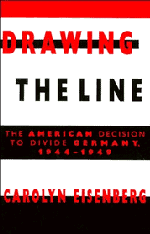Book contents
- Frontmatter
- Contents
- Preface and Acknowledgments
- Germany – Occupation Zones, 1945
- Introduction: Private Polowsky's Oath
- 1 Plans
- 2 Making Peace
- 3 The Limits of Reform: The U.S. Zone
- 4 A Fragile Friendship
- 5 The Russian Challenge
- 6 Bizonal Beginnings
- 7 The Doctors Deliberate
- 8 Marshall's Medicine
- 9 A Separate State
- 10 Cold War Germany
- 11 Winning
- Conclusion: The American Decision to Divide Germany
- Bibliography
- Index
4 - A Fragile Friendship
Published online by Cambridge University Press: 07 October 2009
- Frontmatter
- Contents
- Preface and Acknowledgments
- Germany – Occupation Zones, 1945
- Introduction: Private Polowsky's Oath
- 1 Plans
- 2 Making Peace
- 3 The Limits of Reform: The U.S. Zone
- 4 A Fragile Friendship
- 5 The Russian Challenge
- 6 Bizonal Beginnings
- 7 The Doctors Deliberate
- 8 Marshall's Medicine
- 9 A Separate State
- 10 Cold War Germany
- 11 Winning
- Conclusion: The American Decision to Divide Germany
- Bibliography
- Index
Summary
Mr. Riddleberger raised a question whether it was appropriate to proceed with reparations removals to the USSR until it was clear that the USSR was willing to carry out the political and economic principles of the Potsdam Protocol. …
General Clay took sharp issue with the point of view that it was the USSR which was failing to carry out the Berlin Protocol. The Russians favored the creation of central administrative machinery which the French continued to veto. … Furthermore, General Clay believed that the USSR had gone farther than the French in the introduction of democratic procedures in their zone.…
The entire record of the Control Council showed that the USSR was willing to cooperate with the other powers in operating Germany as a single political and economic unit.
(Resume of Meeting at State Department, November 3, 1945)In the aftermath of Potsdam, U.S. policy makers wished to keep Germany united and to find ways of making the quadripartite machinery work. These intentions were quickly frustrated when the French decided to veto all legislation unifying the country, pending the severance of the Ruhr and Rhineland. Inside U.S. Military Government, there was harsh condemnation of France and a perception of the Soviets as fellow victims of its obstructionism.
The gravity of the French challenge overshadowed other issues: the American retreat from reform, disagreements over reparations, tightening Soviet control in the eastern zone. So long as the French were paralyzing the Allied Control Council, it was difficult to gauge the seriousness of these differences. Based on its experiences in Berlin, the army remained confident that if the French would back down, the quadripartite experiment could succeed.
- Type
- Chapter
- Information
- Drawing the LineThe American Decision to Divide Germany, 1944–1949, pp. 166 - 199Publisher: Cambridge University PressPrint publication year: 1996



